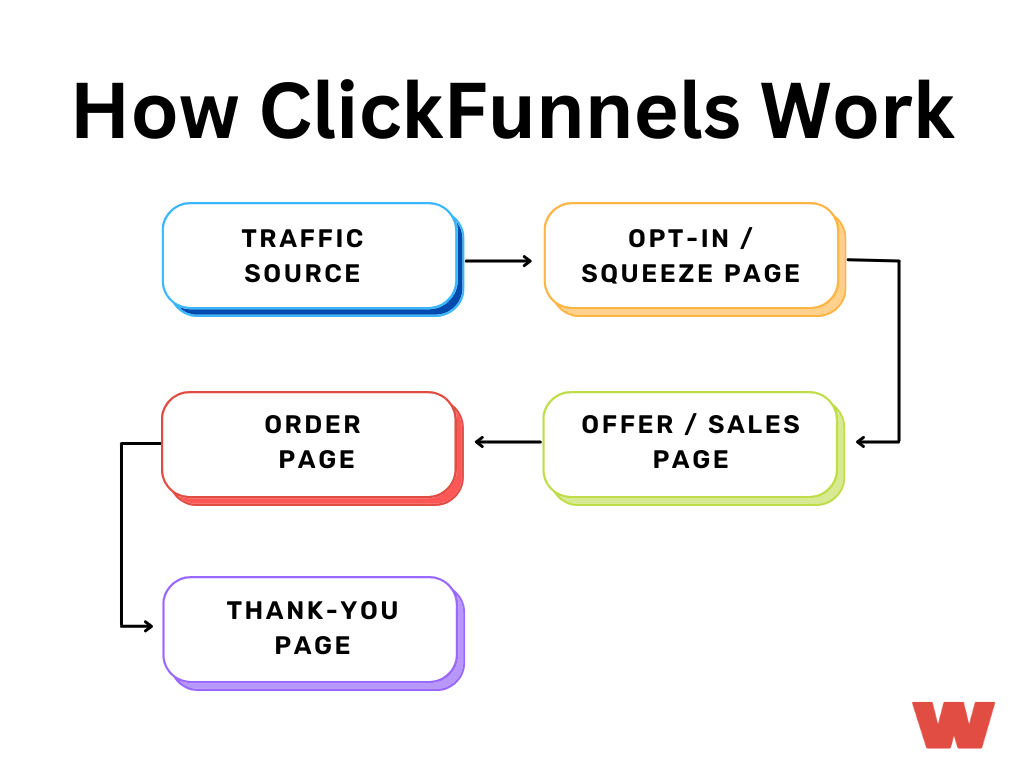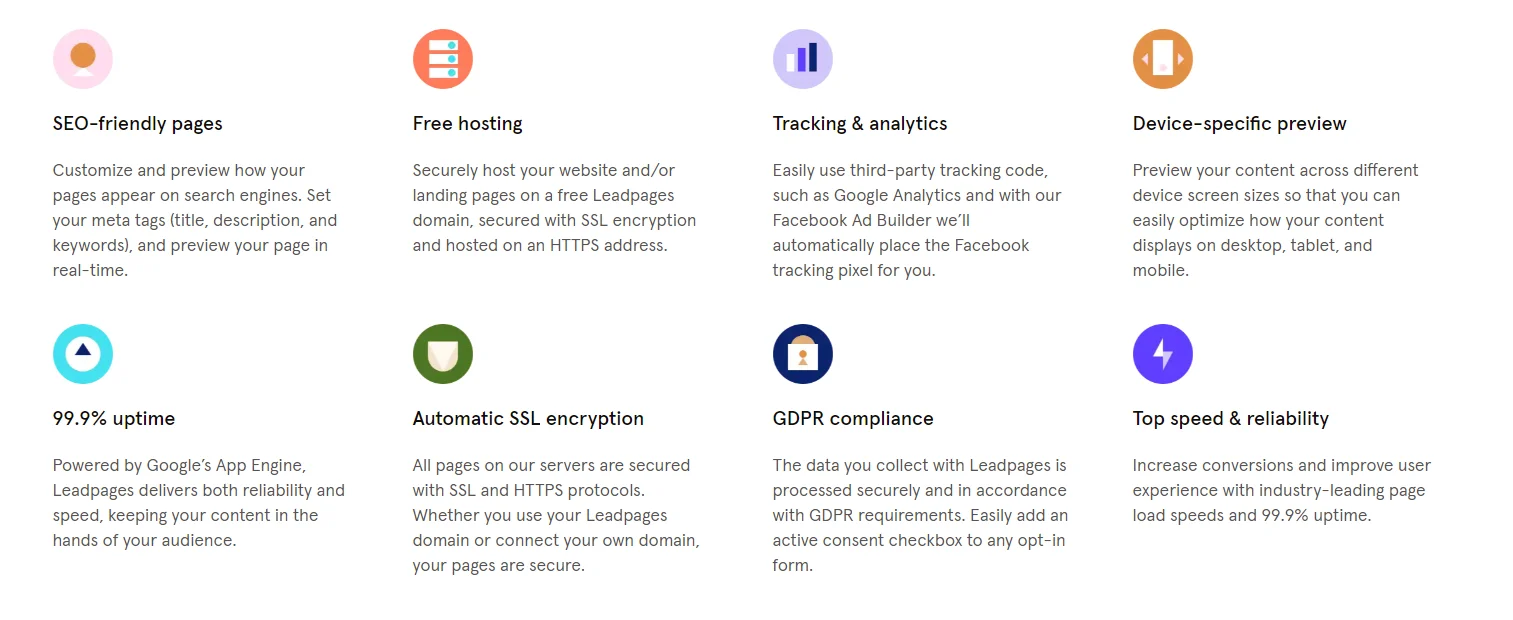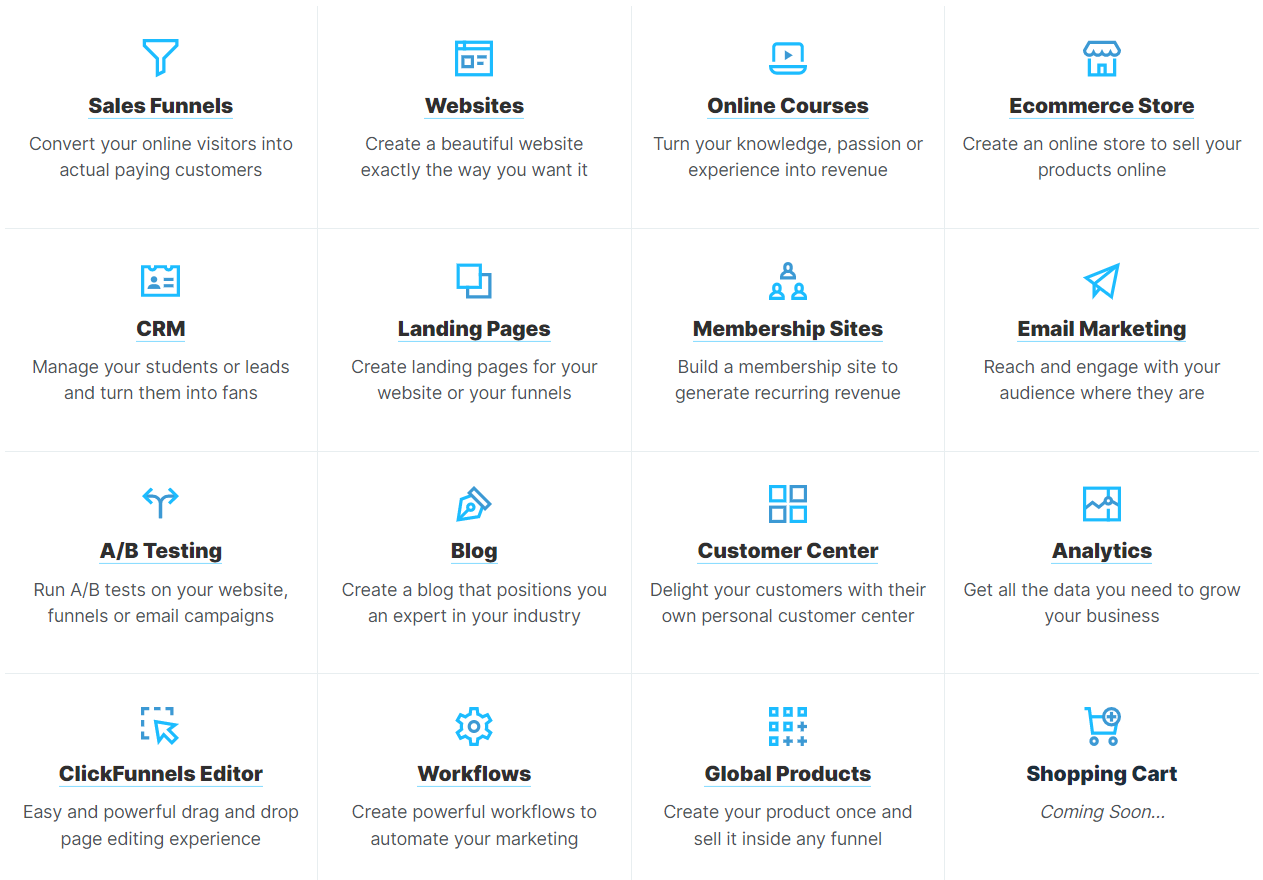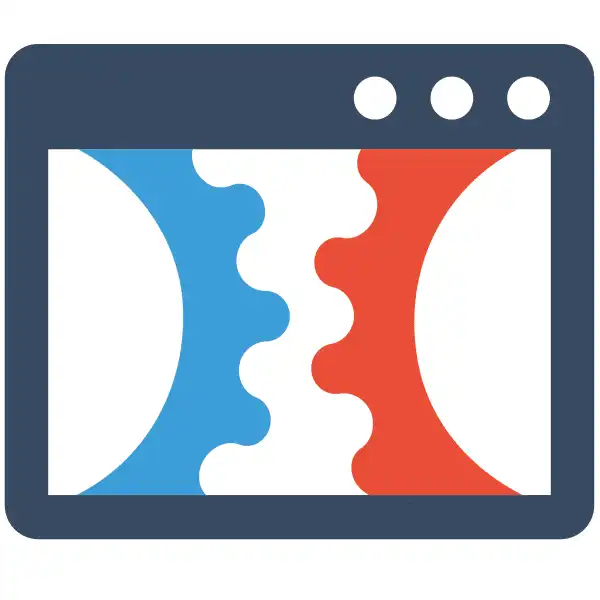If you’re in the online marketing space, chances are you’ve heard of Leadpages and ClickFunnels. They’re both conversion marketing platforms that help businesses increase their leads and sales. So, what is the difference between ClickFunnels vs Leadpages, and which one is best for you?
Summary: Both tools help convert visitors into leads and/or paying customers but the main difference between ClickFunnels and Leadpages is that ClickFunnels is a sales funnel builder and Leadpages is a landing page builder.
Leadpages is a powerful, yet simple, drag-and-drop landing page builder that helps businesses increase their conversion rates.
ClickFunnels, on the other hand, is a full-fledged all-in-one conversion marketing platform that includes everything from landing page builders to email autoresponders to order forms and more.
In short, Leadpages is a great tool for building high-converting landing pages, but if you want a complete conversion marketing solution, ClickFunnels is the way to go.
Here’s a side-by-side comparison so you can see what the main differences between ClickFunnels and Leadpages are.
| Key features | ClickFunnels | Leadpages |
|---|---|---|
| Build converting landing pages | Yes | Yes |
| Build popups, squeeze pages, opt-ins | Yes | Yes |
| Build entire websites | Yes | Yes |
| No-code visual drag-and-drop editor | Yes | Yes |
| Built-in email marketing and newsletters | Yes | Yes |
| A/B testing and experimentation | Yes | Yes |
| Built-in affiliate program software | Yes | No |
| Sales funnel builder (Squeeze Page Funnels, Survey Funnels, Product Launch Funnels, Tripwire Funnels, Follow Up Funnels) | Yes | No |
| Built-in CRM | Yes | No |
| Automation and workflows | Yes | Yes |
| E-commerce, selling products and accepting payments | Yes | Yes |
| Integrates with WordPress | Yes | Yes |
| Create membership sites and webinars | Yes | No |
What Are Landing Pages and Sales Funnels?
A landing page is a web page that is designed to capture a visitor’s contact information, usually in exchange for a freebie or some other incentive.
Leadpages and ClickFunnels are both tools that can be used to create landing pages.
The main difference between the two is that Leadpages is focused solely on creating landing pages, while ClickFunnels is a full-featured marketing platform that can be used for a variety of marketing activities, including creating landing pages.
A sales funnel is a process of narrowing down a large group of potential customers to a smaller group of people who are more likely to buy a product or service.

ClickFunnels is one of the most popular funnel builders out there.
What is the Difference Between Leadpages and ClickFunnels?
Leadpages is a tool that allows you to create landing pages. A landing page is a specific page on your website that is designed to convert visitors into leads. This is usually done by having a lead capture form on the landing page.
Leadpages is a drag-and-drop page builder that allows you to easily create and customize pages for your website, blog, or social media. And, you can use Leadpages to capture leads and grow your email list.

Leadpages is a great tool for those who are just getting started with online marketing. It’s easy to use and doesn’t require any coding knowledge. Plus, Leadpages offers a wide range of templates so you can create a professional-looking landing page without hiring a designer.
ClickFunnels, on the other hand, is a tool that allows you to create sales funnels. A sales funnel is a series of pages on your website that are designed to take a visitor from being a lead to becoming a customer.
ClickFunnels is an all-in-one marketing platform that allows you to capture leads, build your email list, and sell products. ClickFunnels also comes with a built-in shopping cart so you can sell products directly from your website.
ClickFunnels is a great tool for those who are ready to take their online business to the next level. It’s more expensive than Leadpages, but it offers a lot more features. Plus, Clickfunnels is easy to use and comes with a wide range of templates and training materials.

Leadpages is focused on helping you generate leads, while ClickFunnels is focused on helping you close sales.
If you are looking for a tool to help you grow your business, then you should definitely check out Leadpages and ClickFunnels.
Funnel Creation
When it comes to creating marketing funnels, both ClickFunnels and Leadpages offer easy-to-use tools. However, there are some key differences between the two that you should be aware of.
Leadpages is focused on helping you create single landing pages that can be used to drive traffic to an offer. ClickFunnels, on the other hand, is designed to help you create entire sales funnels. This means that ClickFunnels has more features and options than Leadpages.
One of the key features of Clickfunnels is the ability to create order forms and upsells. This can be a valuable tool if you want to increase your average order value. Leadpages does not currently offer this feature.
Another key difference is in the pricing. Leadpages has a monthly subscription model where you pay a flat fee regardless of how many landing pages you create. ClickFunnels, on the other hand, uses a tiered pricing model where you pay more as you add more features.
Overall, ClickFunnels is a more powerful tool than Leadpages. However, it is also more expensive.
If you are just starting out, Leadpages may be the better option. But if you are looking for more features and options, ClickFunnels is the better choice.
Lead Generation
If you’re running an online business, then you know the importance of having a strong email list. After all, your email list is full of people who have already shown an interest in what you have to offer.
But what if you’re just starting out and don’t have a lot of leads yet? That’s where Leadpages comes in.
Leadpages is a powerful tool that can help you grow your email list quickly and efficiently. And once you have a large email list, you can then use it to generate more leads and sales for your business.
So, what is the difference between Leadpages and ClickFunnels? Let’s take a look.
Leadpages is a tool that helps you capture leads. It provides you with a variety of templates that you can use to create high-converting landing pages.
ClickFunnels, on the other hand, is an all-in-one solution that helps you not only capture leads but also convert them into customers. It comes with a built-in email marketing system so you can stay in touch with your leads and customers.
If you’re just starting out and need a tool to help you grow your email list quickly, then Leadpages is a good choice. But if you’re looking for an all-in-one solution that will help you capture leads and convert them into customers, then ClickFunnels is the way to go.
Ease of Use
Are you looking to start an online business, but not sure which platform to use?
If you’re considering Leadpages and ClickFunnels, you’re in luck. Both of these platforms are known for their ease of use and ability to help businesses grow.
What is the difference between Leadpages and ClickFunnels?
When it comes to ease of use, Leadpages is the clear winner. The platform is simple to use and offers a variety of features that businesses can take advantage of.
ClickFunnels, on the other hand, is a bit more complex. While it does offer some features that Leadpages doesn’t, it can be more difficult to use.
In the end, the decision of which platform to use comes down to personal preference. If you’re looking for a simple platform that you can use to get started quickly, Leadpages is a great option.
If you’re looking for a more complex platform with more features, ClickFunnels may be a better choice.
Key Takeaway: To improve the functionality of your website, make sure it is easy to use and navigate, provides the information or services that users are looking for, and is kept up-to-date.
Plans & Pricing
Pricing is always one of the key considerations when choosing any software tool, and both Leadpages and ClickFunnels offer a variety of pricing options to suit different budgets and needs.
Leadpages is generally the more affordable of the two options, with its cheapest plan starting at $37 per month.
ClickFunnels, on the other hand, has a starting price of $127 per month. Learn more about ClickFunnel’s pricing plans here.
However, it’s important to note that Leadpages’ cheapest plan does not include some of the more advanced features that are available with ClickFunnels, such as the ability to create sales funnels, opt-in funnels, and ClickFunnels membership sites.
If you need these features, you’ll need to sign up for one of Leadpages’ more expensive plans, which start at $79 per month.
ClickFunnels also offers a 14-day free trial, which gives you the opportunity to try out all the features of the software before you commit to a paid plan. Leadpages does not offer a free trial, but it does have a 14-day money-back guarantee.
So, what is the difference between Leadpages and ClickFunnels? Pricing is one key difference, with Leadpages being the more affordable option. However, ClickFunnels offers a free trial and more advanced features, while Leadpages has a money-back guarantee.
If you’re trying to decide which one to use for your business, it really comes down to what you need and how much you’re willing to spend. If you just need a simple landing page, Leadpages is a great option. But if you need something more robust, Clickfunnels is the way to go.
Functionality
If you’re running an online business, chances are you’re always looking for ways to improve your website’s functionality. After all, a functional website is a key part of a successful online business.
But what exactly is website functionality?
And how can you improve it?
Website functionality is simply the ability of a website to perform its intended purpose. A functional website is one that is easy to use and navigate, and that provides the information or services that users are looking for.
There are a number of ways to improve the functionality of your website.
1. Make Sure Your Website Is Easy to Use and Navigate
This may seem like a no-brainer, but it’s important to make sure your website is easy to use and navigate. If users can’t figure out how to use your website, they’re not going to stick around for long.
2. Provide the Information or Services That Users Are Looking For
If you want to keep users coming back to your website, you need to make sure you’re providing the information or services they’re looking for. If you’re not sure what users are looking for, try conducting a survey or poll to find out.
3. Keep Your Website Updated
If you want users to keep coming back to your website, you need to make sure you’re keeping it updated with fresh content. If your website is outdated, users will likely move on to a website that is more up-to-date.
4. Make Sure Your Website Is Accessible
This means making sure your website can be accessed by users with disabilities. If your website is not accessible, you could be excluding a large portion of your potential audience.
5. Make Sure Your Website Is Secure
If you’re asking users to enter sensitive information on your website, you need to make sure your website is secure.
This means ensuring that your website is encrypted and that all data is stored securely. These are just a few of the ways you can improve the functionality of your website.
By taking the time to improve your website’s functionality, you’ll be able to keep users coming back to your site and improve your chances of success.
Integrations
But what happens when those platforms don’t talk to each other?
That’s where integrations come in. Integrations allow different software platforms to communicate with each other and share data.
This can be a huge time-saver, and it can help you avoid errors and duplication of effort.
Leadpages and Clickfunnels are two popular platforms used by online businesses. They both offer a lot of features and benefits, but they don’t natively integrate with each other.
That’s where third-party integrations come in.
There are a few different options for integrating Leadpages and Clickfunnels. One is to use a platform like Zapier, which connects different software platforms and automates tasks between them.
Another option is to use a plugin like Leadpages for Clickfunnels, which adds Leadpages functionality to Clickfunnels.
Whichever option you choose, integrating Leadpages and Clickfunnels can save you a lot of time and hassle. It can also help you avoid errors and duplication of effort.
Templates and Designs
When it comes to online businesses, there are two schools of thought when it comes to website templates. Some people believe that using a template is the quickest and easiest way to get a website up and running.
Others believe that templates are limiting and that it’s better to start from scratch.
Leadpages is a website builder that lets you create pages without having to code them from scratch. You can choose from a variety of pre-designed templates or create your own custom pages.
ClickFunnels, on the other hand, is a bit more complex. It’s designed for people who want to create sales funnels, which are a series of pages that lead a customer through a purchase.
ClickFunnels also has a drag-and-drop editor, but it’s more complex than Leadpages.
If you’re primarily focused on lead generation, then Leadpages is a great option. But if you’re looking to increase your sales and grow your business, then ClickFunnels is the way to go.
Both platforms have their pros and cons, so it’s really up to you to decide which one is right for your business.
Pros and Cons
ClickFunnels
Pros:
- #1 best all-in-one landing page builder and sales funnel builder on the market right now.
- Let’s you build e-commerce sites, build membership sites and online courses
- Includes affiliate program software to incentivize publishers to promote your product or service.
- Check out my ClickFunnels review where I list every feature.
Cons:
- Is more expensive than Leadpages, but then again you get a lot more features as well.
- See my rundown of the best alternatives to ClickFunnels here.
Leadpages
Pros:
- Best for building landing pages, or entire websites, that convert visitors into leads.
- An easy-to-use drag-and-drop visual landing page builder that makes creating landing pages quick and super easy.
Cons:
- Can only create landing pages – if you only need a relatively cheap landing page builder, then Leadpages is the way to go.
- See my rundown of the best Leadpages alternatives here.
Our Verdict ⭐
Now that you know what is the difference between Leadpages and ClickFunnels, you can decide which software fits your business goals.
If you need a lot of features and integrations, ClickFunnels is the better choice.
ClickFunnels gives you everything you need to market, sell, and deliver your products and services online using funnels and landing pages! Without ever having to hire or rely on a team of developers, designers or marketers!
However, if you’re looking for an easy-to-use platform with a lower price tag, Leadpages is the way to go.
How We Evaluate Landing Page & Sales Funnel Builders: Our Methodology
When we dive into testing landing page builders and sales funnel builders, we’re not just skimming the surface. We’re getting our hands dirty, exploring every nook and cranny to understand how these tools can truly impact a business’s bottom line. Our methodology isn’t just about ticking boxes; it’s about experiencing the tool just as a real user would.
First Impressions Count: Our evaluation begins with the sign-up process. Is it as easy as a Sunday morning, or does it feel like a Monday morning slog? We look for simplicity and clarity. A complicated start can be a big turn-off, and we want to know if these builders understand that.
Building the Funnel: Once we’re all set up and in, it’s time to roll up our sleeves and start building. How intuitive is the interface? Can a beginner navigate it as smoothly as a pro? We build funnels from scratch, paying close attention to the variety of templates and customization options. We’re looking for flexibility and creativity, but also efficiency – because in the world of sales, time is indeed money.
Integrations and Compatibility: In today’s interconnected digital world, a sales funnel builder needs to be a team player. We test integrations with popular CRMs, email marketing tools, payment processors, and more. Seamless integration can be the make-or-break factor in a funnel builder’s usability.
Performance Under Pressure: What’s a great-looking funnel if it doesn’t perform? We put these builders through rigorous testing. Loading times, mobile responsiveness, and overall stability are under our microscope. We also delve into the analytics – how well can these tools track user behavior, conversion rates, and other critical metrics?
Support and Resources: Even the most intuitive tools can leave you with questions. We evaluate the support provided: Are there helpful guides, responsive customer service, and community forums? We ask questions, hunt for solutions, and gauge how quickly and effectively the support team responds.
Cost vs. Value: Lastly, we evaluate the pricing structures. We weigh the features against the costs, looking for value for money. It’s not just about the cheapest option; it’s about what you get for your investment.
For more information about our review process, click here.
References:

